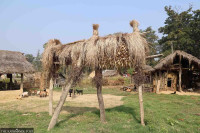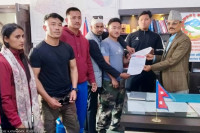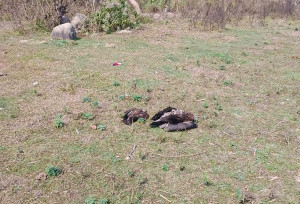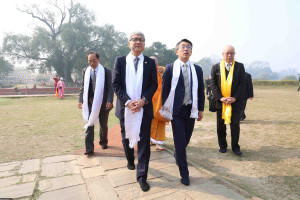Lumbini Province
Flow of returnees increases but testing goes down
The sheer volume of people entering Nepal through Nepal-India border points has made it difficult to test all returnees, health workers say.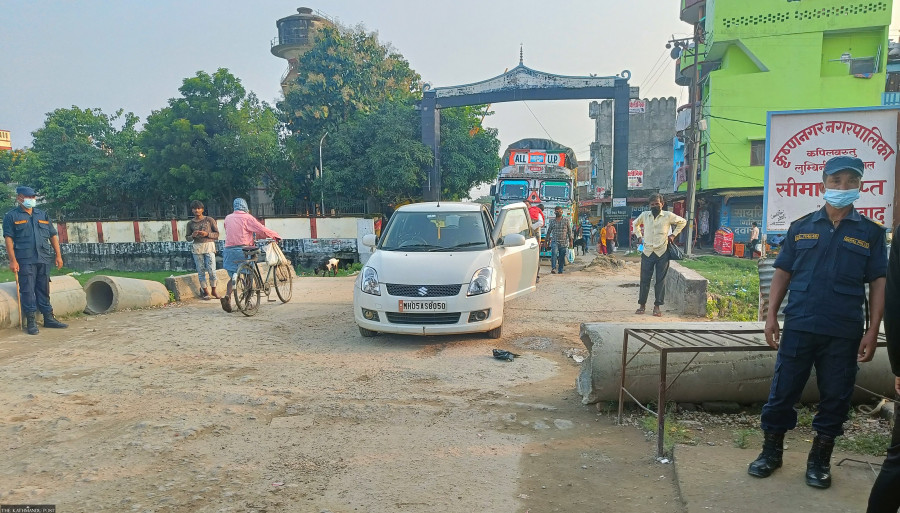
Rupa Gahatraj
On September 30, a group of five migrant workers reached Jamunaha border point in Nepalgunj from India, seeking entry into Nepal. The health workers deployed at the border point ran antigen tests on them. One of the returnees tested positive for Covid-19 but the group was still allowed to enter Nepalgunj.
Health workers deployed at the border points in Lumbini Province run antigen tests on Covid-19 suspects and those with no proof of vaccination but there are no restrictions on those testing positive for Covid-19.
Like the youth who tested positive on September 30, most walk across the border and into busy markets without adopting any health safety measures, said one of the security personnel deployed at the Jamunaha border point in Banke district.
Every day, 1,500 to 2,000 migrant workers from India are entering Nepal from the border point, according to the record kept by the security personnel at the border.
The sheer volume of people entering Nepal through the border point has made it difficult to run tests on each individual crossing the border, says Chiranjibi Gyawali, a health worker deployed at the health desk in Jamunaha.
“We provide consultations to the infected and send them home with suggestions to stay in isolation. It is not possible to test everyone. We run tests only on those suspected of having Covid-19,” Gyawali told the Post.
Until August 26, the Nepal Red Cross Society had deployed ambulances to carry Covid-19-infected individuals to their respective districts from the border point.
“But the agreement between the Red Cross and the District Covid-19 Management Centre has ended. These days, Covid-19-infected individuals are free to go home without any restrictions,” said Gyawali, adding that he has been informing the concerned stakeholders about the situation but to no avail.
At the Krishnanagar border point in Kapilvastu, 300 people cross into Nepal every day, according to the data kept by security personnel at the border.
Mayor of Krishnanagar Municipality in Kapilvastu Rajat Pratap Shah says the health desk at the border point operates from 8am to 6pm every day.
“Health workers at the desk take the body temperatures of returnees and inquire about their health condition. They also run antigen tests on Covid-19 suspects. Then the returnees are free to enter Nepal,” he said. “There are no quarantine measures for returnees who could be possible carriers of the virus.”
According to him, the municipality will soon start deploying health workers to the border point on night shifts.
In Rupandehi, the District Health Office is preparing to expand antigen testing at Sunauli border point.
Dr Rajendra Giri, chief at the District Health Office in Rupandehi, says his office is planning to expand testing at the border since the flow of returnees for the upcoming festive season has increased in recent days.
Until a few weeks ago, as many as 160 antigen tests were being conducted on people entering Nepal through the border point but now the number has dwindled to 50 despite the increasing flow of returnees.
The isolation facilities set up near the Sunauli border are almost empty.
According to Rishiram Tiwari, the chief district officer of Rupandehi, the returnees who test positive for Covid-19 are sent to their destinations in coordination with the respective local units.
“We have a vehicle on standby near the border point. With the assistance of the Nepal Red Cross Society, we send Covid-19-infected returnees to their homes in the vehicle,” said Tiwari.
According to the District Health Office in Rupandehi, out of 576 people who underwent antigen testing at the Sunauli-Belahiya border point, only two tested positive for Covid-19 in the past week.
Krishna Prasad Aryal, the inspector at the Armed Police Force border outpost in Danda, said that while it is mandatory for foreigners seeking to enter Nepal to furnish a Polymerase Chain Reaction test report, it is not the case for Nepali returnees.
Meanwhile, in Kanchanpur, the isolation facility set up at the Community Health Institute in Mahendranagar is still in operation. Returnees entering Nepal through the Gaddachauki border point are sent directly to the isolation facility if they test positive for Covid-19. Currently, 11 people are staying at the facility.
According to the District Health Office in Kanchanpur, an ambulance of the Mahakali Provincial Hospital is being used to carry the infected people from Gaddachauki border point to the isolation facility.
“Some of the infected go home after staying at the isolation facility for 14 days while others who prefer home isolation are sent home on the recommendation of the concerned local unit,” said Siddaraj Bhatta, the public health inspector at the health office.
Of late, the number of people returning home from India is on the rise, as Dashain, a major Hindu festival, is round the corner. According to the security personnel deployed at Gaddachauki border area, around 700 people enter Nepal through the border point on a daily basis.
A total of 788 people entered Nepal through Gaddachauki on Saturday. Health workers conducted antigen testing of 756 people; of them, one tested positive.
Similarly, a total of 424 people entered Nepal through the Gauriphanta border point in Kailali district on Saturday. The health workers conducted antigen tests on 225 people. No one tested positive.
On the other hand, an isolation centre has been set up at Urma in Dhangadhi Sub-Metropolitan City-15 for the returnees infected with Covid-19.
According to Dinesh Thakulla, in-charge at the health desk set up at Gauriphanta border point, out of 1,000 people who underwent antigen testing in the past week, not a single person tested positive for Covid-19.
“More than 500 people cross the border point on a daily basis. We are unable to conduct testing on all returnees due to a lack of manpower and other resources,” said Thakulla.
(With inputs from Bhawani Bhatta in Kanchanpur, Mohan Budhaair in Kailali, Manoj Paudel in Kapilvastu and Madhav Dhungana in Bhairahawa.)




 9.89°C Kathmandu
9.89°C Kathmandu
